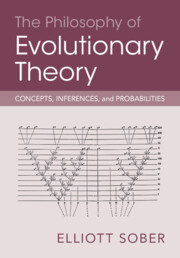Book contents
- The Philosophy of Evolutionary Theory
- The Philosophy of Evolutionary Theory
- Copyright page
- Dedication
- Contents
- Figures
- Tables
- Preface
- Acknowledgments
- 1 A Darwinian Introduction
- 2 Fitness and Natural Selection
- 3 Units of Selection
- 4 Common Ancestry
- 5 Drift
- 6 Mutation
- 7 Taxa and Genealogy
- 8 Adaptationism
- 9 Big-Picture Questions
- References
- Index
7 - Taxa and Genealogy
Published online by Cambridge University Press: 01 February 2024
- The Philosophy of Evolutionary Theory
- The Philosophy of Evolutionary Theory
- Copyright page
- Dedication
- Contents
- Figures
- Tables
- Preface
- Acknowledgments
- 1 A Darwinian Introduction
- 2 Fitness and Natural Selection
- 3 Units of Selection
- 4 Common Ancestry
- 5 Drift
- 6 Mutation
- 7 Taxa and Genealogy
- 8 Adaptationism
- 9 Big-Picture Questions
- References
- Index
Summary
● Pheneticism, evolutionary taxonomy, and cladistics are competing taxonomic philosophies; they disagree about how the classification of a group of organisms and the genealogies of those organisms are related. The cladistic approach is defended. ● It is widely agreed that it is a matter of convention whether a set of species should be placed into a single genus or into more than one. The point generalizes – superspecific taxonomic rank is a matter of convention. ● It is a separate question whether it is conventional matter whether a set of organisms comprises one species rather than several. ● The view is defended that biological taxa are spatio-temporally extended physical objects; they are “individuals,” not natural kinds. ● The question is explored of whether human races are biologically real. ● Cladistic parsimony is explained; it is a method for inferring phylogenies that differs from the method of maximum likelihood. ● The question is raised as to whether parsimony should be evaluated by using the law of likelihood; an alternative is explored – that both methods should be evaluated by seeing whether they are statistically consistent.
Keywords
- Type
- Chapter
- Information
- The Philosophy of Evolutionary TheoryConcepts, Inferences, and Probabilities, pp. 167 - 205Publisher: Cambridge University PressPrint publication year: 2024

